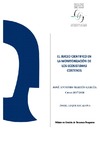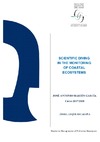Identificador persistente para citar o vincular este elemento:
https://accedacris.ulpgc.es/jspui/handle/10553/73441
| Campo DC | Valor | idioma |
|---|---|---|
| dc.contributor.advisor | Luque Escalona, Ángel | - |
| dc.contributor.author | Martín García, José Antonio | - |
| dc.date.accessioned | 2020-06-23T07:42:10Z | - |
| dc.date.available | 2020-06-23T07:42:10Z | - |
| dc.date.issued | 2018 | en_US |
| dc.identifier.uri | https://accedacris.ulpgc.es/handle/10553/73441 | - |
| dc.description.abstract | "Scientific diving has become a tool for knowledge of the sea due to the advance-" "ment of autonomous diving technologies that have given greater independence to the diver, with the ability to be much longer in the bottom and observe the submerged ecosystems, its biocenosis and the behavior of the species." "The international scientific community through the di↵erent international orga- nizations recognizes scientific diving as a necessary tool for scientific research, arriving to define both the scientific diving as the scientific diver and the scien- tific team among others." "Unesco, like other organizations, publishes manuals together with CMAS on the ethics and behavior of the scientific diver in the marine environment, as well as safety standards in scientific diving." "This causes that said diving activity to be considered as di↵erent from professio- nal diving and recreational sports diving. The decree of the Ministry of Public Works of 1997 on safety standards in diving established that it should follow the rules of professional diving, so that signatures were collected in all Spanish universities and research centers to modify it. In 2000 a decree was published modifying in part the safety rules in diving and introducing the figure of the scientific diver, this regulation is still in force at the moment." "Currently, a new regulation has been proposed and the Ministry of Development has opened a period of consultations on it for its review and publication." "With the publication of the European directives on water quality and the pro- tection of the marine environment and its implementation and implementation in Spain, the need to have a very large group of scientific divers that meet the multiple needs of monitoring has been highlighted. evaluate the environmental status of submerged ecosystems and take all the parameters required by the directives." "The necessary work techniques for this monitoring are exposed, from the or- ganization of the campaigns to the taking of data, evaluating the need of the realization of courses that cover the needs of training in scientific diving. These courses certify the knowledge of the marine environment, work techniques and safety in diving. Some organizations such as ac CMAS grant degrees recognized by Unesco." "Nowadays courses are given in many national and international universities, as well as many international organizations accredit courses of scientific divers, pointing out the requirements of content, all of them have in common not only" "vii" "viii" "the knowledge on the underwater scientific activity but on the security in the" "practice of scientific diving." "These titles are valid in many countries, being able to be hired and to practice as scientific divers, giving a more exit to the future graduates of the di↵erent races dedicated to the marine environment." "The subjects taught in these courses are varied and comprehensive trying to cover all about the marine environment, such as: Biology, Ecology, Physics, Physiopathology, Statistics, Archeology, Installation of measuring equipment, Photography, Video, First Aid, Rescue, Legislation , Coordination of campaigns, Security rules, etc." | en_US |
| dc.description.abstract | El buceo científico se ha convertido en una herramienta para el conocimiento del mar debido al avance de las tecnologías de buceo autónomo que han dado una mayor independencia al buceador, con la capacidad de poder estar mucho más tiempo en el fondo y observar los ecosistemas sumergidos, su biocenosis y el comportamiento de las especies. La comunidad científica internacional a través de las distintas organizaciones internacionales reconoce el buceo científico como una herramienta necesaria para la investigación científica, llegándola a definir tanto el buceo científico como al buceador científico y al equipo científico entre otros. La Unesco al igual que otras organizaciones editan manuales conjuntamente con CMAS sobre la ética y el comportamiento del buceador científico en el medio marino, asícomo los estçandares de seguridad en el buceo científico. Esto hace que se planteara dicha actividad de buceo como diferente del buceo profesional y el buceo deportivo recreativo. El decreto del Ministerio de Fomento de 1997 sobre las normas de seguridad en el buceo estableció que debía seguir la normativa del buceo profesional, por lo que se recogieron firmas en todas las universidades y centros de investigación españoles para modificarlo. En el año 2000 se publicó un decreto modificando en parte las normas de seguridad en el buceo e introduciendo la figura del buceador científico, esta normativa sigue en vigor actualmente. Actualmente se ha propuesto una nueva normativa y el Ministerio de Fomento ha abierto un periodo de consultas sobre la misma para su revisión y publicación. Con la publicación de la directivas europeas de calidad de aguas y de protección del medio marino y su implantación e implementación en España, se ha puesto de manifiesto la necesidad de contar con un grupo muy amplio de buceadores científicos que atiendan la múltiples necesidades de monitorización para evaluar el estado ambiental de los ecosistemas sumergidos y tomen todos los parámetros que exigen las directivas. Se exponen las técnicas de trabajo necesarias para esta monitorización, desde la organización de las campañas hasta la toma de datos, evaluando la necesidad de la realización de cursos que cubran las necesidades de formación en buceo científico. Estos cursos acreditan el conocimiento del medio marino, técnicas de trabajo y seguridad en el buceo. Algunas organizaciones como CMAS otorgan títulos reconocidos por la Unesco. Hoy día se imparten cursos en muchas universidades nacionales e internacionales, as´ı como muchísimas organizaciones internacionales acreditan cursos de buceadores científico, señalando los requisitos de contenido, todos ellos tienen en común no solo el conocimiento sobre la actividad científica subacuática si no sobre la seguridad en la práctica del buceo científico. Las materias impartidas en estos cursos son variadas y amplias intentando cubrir todos los conocimientos sobre el medio marino, como: Biología, Ecología, Física, Fisiopatología, Estadística, Arqueología, Instalación de equipos de medición, Fotografía, Vídeo, Primeros auxilios, Rescate, Legislación, Coordinación de campañas, Normas de seguridad, etc. Estos títulos tienen validez en muchos países, pudiendo ser contratados y ejercer como buceadores científicos, dando una salida más a los futuros titulados de las diferentes carreras dedicadas al medio marino. | en_US |
| dc.language | eng | en_US |
| dc.subject | 241705 Biología marina | en_US |
| dc.subject.other | Scientific diving | es |
| dc.title | Scientific diving in the monitoring of coastal ecosystems | en_US |
| dc.title.alternative | El Buceo científico en la monitorización de los ecosistemas costeros | en_US |
| dc.type | info:eu-repo/semantics/masterThesis | en_US |
| dc.type | MasterThesis | en_US |
| dc.contributor.departamento | Departamento de Biología | en_US |
| dc.contributor.facultad | Facultad de Ciencias del Mar | en_US |
| dc.investigacion | Ciencias | en_US |
| dc.type2 | Trabajo final de máster | en_US |
| dc.description.notas | Máster en Gestión Sostenible de Recursos Pesqueros ; 2017-2018. Texto en inglés y español | en_US |
| dc.utils.revision | Sí | en_US |
| dc.identifier.matricula | TFT-46492 | es |
| dc.identifier.ulpgc | Sí | es |
| dc.contributor.buulpgc | BU-BAS | en_US |
| dc.contributor.titulacion | Máster Universitario en Gestión Sostenible de Recursos Pesqueros | es |
| item.grantfulltext | open | - |
| item.fulltext | Con texto completo | - |
| crisitem.author.orcid | 0000-0001-6731-6147 | - |
| crisitem.author.fullName | Martín García, Jose Antonio | - |
| crisitem.advisor.dept | Departamento de Biología | - |
| Colección: | Trabajo final de máster | |
Visitas
332
actualizado el 12-jul-2025
Descargas
2.128
actualizado el 12-jul-2025
Google ScholarTM
Verifica
Comparte
Exporta metadatos
Los elementos en ULPGC accedaCRIS están protegidos por derechos de autor con todos los derechos reservados, a menos que se indique lo contrario.

